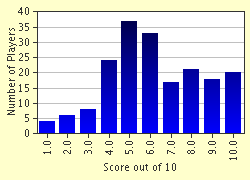Quiz Answer Key and Fun Facts
1. What is the correct (official) name of AA's basic text?
2. What are the last names of the two men who are credited as being the founders of AA?
3. How many "Steps" did the early form of AA have in 1935?
4. AA's success rates of the 1990s are comparable to that of those who "recover spontaneously".
5. AA teaches that the Twelve Steps are the ONLY way to sobriety.
6. You must subscribe to a traditional Judeo-Christian belief structure in order to fully work the steps in AA.
7. Who was the third member of AA?
8. Whose personal story is the only one that appears in the "Basic Text" portion of the "Big Book" rather than "Personal Stories"?
9. Of the following famous AA's, whose date of sobriety predated the founding of AA?
10. Of the following, who may join AA?
Source: Author
Chadler
This quiz was reviewed by FunTrivia editor
Bruyere before going online.
Any errors found in FunTrivia content are routinely corrected through our feedback system.


